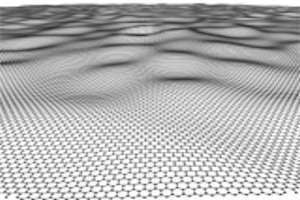Researchers from the University of Manchester have discovered that graphene allows protons to pass through it, whilst blocking all other liquids and gases.
 Graphene allows protons to pass through it, contrary to previous thinking
Graphene allows protons to pass through it, contrary to previous thinking
The findings, published in the journal Nature, could transform fuel cell technology and other technologies based on hydrogen. Hydrogen ions are actually just protons, so a thin membrane which selectively permits protons to pass through would enable technologies such as extraction of atmospheric hydrogen, and purification of hydrogen for use in fuel cells.
In 2004, University of Manchester researchers Kostya Novoselov and Andre Geim fabricated graphene material, which is a one- atom-thick sheet of carbon - the discovery won the pair a Nobel Prize in 2010. Graphene is known for its spectacular properties, and has been touted as a revolutionary material for a variety of applications, from electronics to anti-corrosion coatings.
Initially, prevailing theories suggested that protons, like other molecules, would not be able to pass through a graphene membranes. However, this new study by Andre Geim's research group showed that proton transport was possible, especially at high temperatures and if the films were given a catalytic nanoparticle coating.
This finding enhances the potential applications of graphene and boron nitride monolayers as proton-conducting membranes in modern fuel cells. Hydrogen fuel cells combine hydrogen with oxygen to generate electricity, but fuel crossover is a major limitation on the durability and efficiency of current designs.
Graphene and boron nitride membranes could greatly reduce fuel crossover and poisoning, according to the researchers. This capability could make hydrogen-powered fuel cells much more competitive
The possibility of isolating pure hydrogen from a mixture of gases also allows for the possiblity of a portable generator which is powered by air - extracting hydrogen from the moisture in the atmosphere on demand. However, the level of water required to make this viable would probably limit applications to very humid environments.
“It looks extremely simple and equally promising. Because graphene can be produced these days in square metre sheets, we hope that it will find its way to commercial fuel cells sooner rather than later”.
Dr Sheng Hu, lead author
Sources
Proton transport through one atom thick crystals - S. Hu et al, Nature 2014.
University of Manchester - Protons fuel graphene prospects